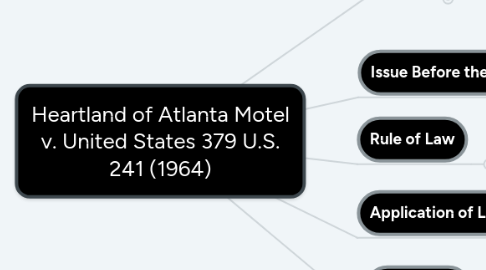
1. Facts
1.1. Parties
1.1.1. Heartland of Atlanta Motel, Inc.
1.1.2. United States
1.2. What Happened
1.2.1. Congress Passed the Civil Rights Act of 1964 and in turn Heartland Motel still refused to rent rooms to African Americans.
1.2.2. Heartland of Atlanta Motel was discriminating on race by not renting rooms to African American individuals
1.3. Procedural History
1.3.1. Three-Judge District Court
1.3.1.1. Ruled the Civil Rights Act did not Violate the United States Constitution and prohibited the Heartland Hotel from discriminating based on race.
1.3.2. Appealed to the United States Supreme Court
2. Issue Before the Court
2.1. Whether Congress has exceeded or overreached its authority under the Commerce Clause by enacting and implementing the Civil Rights Act of 1964 upon private businesses
3. Rule of Law
3.1. The 14th Amendment prohibits discrimination by race by the states
3.1.1. Civil Rights act of 1875, pertaining to public places
3.1.2. The Civil Rights Cases (1883) deemed it Unconstitutional for the 14th Amendment to be imposed upon private business
3.2. Under the Commerce Clause congress can regulate business under interstate commerce
3.2.1. Can the Appellant show that the Commerce Clause is being used unconstitutionally by Congress and that his/her business is not subject to interstate commerce
4. Application of Law
4.1. The Appellant argues that Congress is violating his 5th amendment rights by not allowing the 216 room Motel to be operated the way they want, in their home state, being a private business
4.1.1. It was proved that approximately 75% of guests were from out off state
4.1.2. Accessible from Interstate highways 75 and 85 and State highways
4.1.2.1. Court states that the Heart of Atlanta Motel is an "important facility" used by frequent travelers for lodging, making their trips comfortable and safe over extreme distances
4.1.3. Plaintiff advertises and solicits extensively on interstate roadways and bordering states
4.2. Appellant did not bring any proof to back up allegations. Instead used stipulation of facts
4.2.1. Court states that Congress has ample authority in the Act under interstate commerce and the Commerce Clause
